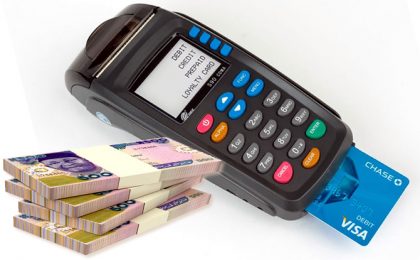Business
Nigerians carry out N1.8trn PoS deals in 10 months

The recent review of the monthly statistics released by the Nigeria Interbank Settlement System (NIBSS) has shown that in just 10 months, Nigerians have performed transactions worth N1.8 trillion over the Point of Sales terminals.
The report also shows that the value of October deals topped other months, as transactions shot up to N212.368 billion in one month.
It would be recalled that last year, Nigeria recorded its highest PoS transaction value since it was introduced in 2012, as deals valued at N1.4 trillion were carried out.
However, with this year’s 10 months performance, the country has already surpassed the 2017 record by 28.5 per cent. With less than two months to the end of the year, analysts expect the full year 2018 figure to surpass the previous year by over 50 per cent due to increased spending activities towards year-end.
A breakdown of the monthly NIBSS statistics showed that transactions worth N152 billion were carried out over the electronic platform last January, while N144 billion was recorded in February. In March and April, N177 billion and N172 billion were recorded respectively. The data showed that Nigerians spent N189 billion over PoS terminals in May, while N181 billion was recorded in June. In July, August and September, the value of transactions stood at N185 billion, N204 billion and N200 billion respectively.
Further analysis of the NIBSS data also revealed that the N1.8 trillion 10 months value was derived from 224.5 million deals over 200, 239 PoS terminals deployed across the country.
Meanwhile, the statistics revealed that while the numbers of registered PoS machines increased by 1,500 in October to 238,511, over 38,000 units of the machines are yet to be deployed for business.
According to analysts, the huge growth in PoS is due to a combination of factors such as increased adoption by SMEs, chain business owners, increased awareness as well by cardholders, who ask for the POS from business owners when making payments and improved dispute resolution process for failed transactions.
Explaining the factors for the growth in e-payment transactions, Chairman, Committee of E-Business Industry Heads, CeBIH, Mr. Stanley Jacob, said that “the stability of the systems, both at NIBSS and the partner banks, has also improved the trust level of the users, as they are now assured of better dispute resolution, instant reversals in cases of failures and high uptime availability.”
He added that the growth in PoS usage cannot be separated from the behavioural change that was triggered by the implementation of the cashless initiative at some point.
“Though the cashless implementation is yet to be stable, the customers expect that this will happen anytime soon and they are bracing up for it,” he said. “Also, increase in the number of bank account holders with a card and the increased investments banks have made in PoS has given the channel a boost.”
He also attributed the impressive growth recorded in value of PoS transactions to the expansion in the number of agents, prompted by the Shared Agent Network Expansion Facilities, SANEF, initiated by the Bankers’ Committee in first quarter of the year.
The growths in electronic payment are despite incidences of frauds across the various platforms. Just recently, a customer of one of the commercial banks was arraigned in court for defrauding the lender to the tune of N1.2 billion, using the PoS terminal allocated to him by the bank. Recent data the Nigerian Electronic Fraud Forum (NeFF) shows that ATM, PoS, and the Web are the top channels for fraudulent transactions perpetrated in the industry.
However, the Director, Banking and Payment System at CBN, Mr. Dipo Fatokun, said to address the issue of frauds over PoS, the apex bank is now collaborating with the commercial banks to ensure proper profiling of the people being issued PoS terminals. According to Fatokun, who is also the chairman of NeFF, the banks must ensure that they only give to genuine merchants and they profile them to know that they are real.
With slow growth of mobile money, PoS has been the main driver of government’s cashless policy in Nigeria. Most of the departmental stores, fuel stations and some small businesses now have POS machines and this encourage people to go for shopping with just their ATM cards.



